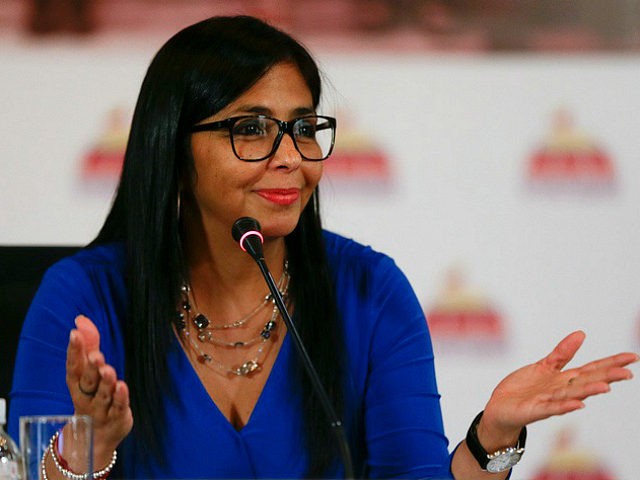The “national constituent assembly” (ANC), an illegal lawmaking body created by dictator Nicolás Maduro, confirmed on Monday that it would regulate the messages private companies post on social media to combat an alleged “psychological war” occurring against socialism.
The president of the ANC, former foreign minister Delcy Rodríguez, said on television that the move was necessary to prevent “a repetition of what happened to Rwanda in Venezuela,” referring to the 1994 genocide of Tutsis spurred on in part by radio stations urging Hutu Rwandans to kill their neighbors.
Unlike Rwanda, Venezuela suffers no significant tension between its racial groups and most Venezuelans are ethnically Venezuelan, with small pockets of Mideast transplants and indigenous communities. There is no significant evidence of Venezuelan media promoting genocide or racial animosity, and Rodríguez did not present any.
The only recent prominent example of discrimination in Venezuelan politics is the 2013 Maduro presidential campaign, which repeatedly used anti-Semitic tropes against opponent Henrique Capriles Radonski.
Maduro’s history of anti-Semitic statements did not come up during Rodríguez’s announcement Monday. Instead, the head of the ANC announced that the body would “regulate companies” using social media “because Venezuela in the past years has been the victim of a laboratory of psychological war” intended to trigger a “fratricide.”
“We will not allow for the repetition of what happened to Rwanda in Venezuela, when over 800,000 lost their lives thanks to hate messages on local radio,” she asserted.
Limiting social media usage by corporations “will avoid the proliferation of messages calling to hate, intolerance, and war,” Rodríguez claimed, according to state media.
This regulation is part of a greater push to limit speech in Venezuela, codified in the ANC’s “Law Against Hate and Intolerance,” the first “law” the “congress” is debating:
Rodríguez had warned that such a social media regulation law was in deliberation last week, warning that “strong sanctions” against “the emission of messages of hate and intolerance” would take hold. She did not specify what sorts of “sanctions” a company could face for posting a message the government does not approve of on social media, nor has she since those remarks.
At the time, however, she provided at least one example of the sort of speech Venezuela would punish — an alleged tweet “from an opposition political party threatening the mayor of Caracas.” She did not specify the content of the tweet. The acting mayor of Caracas is a chavista loyalist; the legitimate mayor of Caracas, Antonio Ledezma, is currently serving prison time in house arrest after secret police detained him in 2015. He has not been convicted of any crime.
The ANC has since acted against two Colombian broadcasting outlets, Caracol and RCN, for reporting on recent comments by former Mexican president Vicente Fox, who said dictator Maduro could only resign or “leave there with his feet out in front of him, in a coffin.” The government took both channels off the air. At the time, the ANC had begun threatening sanctions against American corporations like Twitter and Instagram if they did not curb speech on their platforms that the socialist government disapproved of.
Maduro created the ANC this summer to replace the democratically-elected, opposition-held National Assembly, the legitimate legislative body of the nation. There is no legal basis for the creation of the ANC and the July 30 election for ANC positions featured only chavista candidates, including Maduro’s wife Cilia Flores and son Nicolás Maduro Moros.

COMMENTS
Please let us know if you're having issues with commenting.